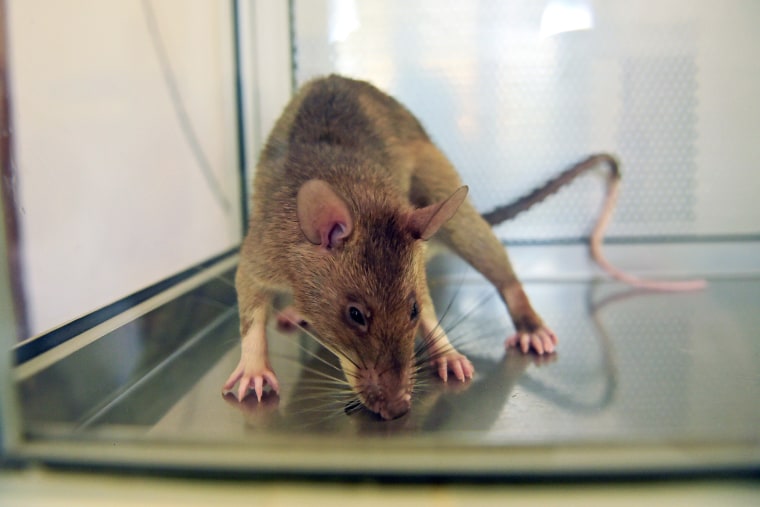The risk of people with monkeypox passing the virus to their pets is low, the authors of a new study that found no such transmissions in the United Kingdom have concluded.
The study’s findings offer a broader perspective in the wake of two recently reported cases of apparent monkeypox transmission from humans to their pets, including a dog in France and a puppy in Brazil.
Such rare cases tap into fears that the global monkeypox outbreak could spill over from humans and become endemic in new populations of wild animals. Infectious disease experts anticipate that if such animal reservoirs of the virus were established, they could be impossible to eradicate, or at least challenging to control, and could spark new outbreaks among humans.
“I believe that such a risk is becoming higher,” said Huaiping Zhu, director of the Centre for Diseases Modeling at York University in Toronto, arguing that even with global cases declining, cases and the increasing number of rodents still translates to more risk. Zhu is the lead author of a separate study published in September in the Journal of Medical Virology that used mathematical modeling to project how monkeypox might spread from an animal host in a theoretical metropolitan area.

Since monkeypox was first discovered in a research monkey in 1958 and humans in 1970, the virus has become endemic in 11 western and central African nations. It has periodically jumped from animals to humans in the region, but until this year had not been documented spreading very widely from person to person. Thanks to what public health experts decry as a woeful lack of investment in monkeypox research predating this year’s outbreak, scientists remain uncertain which animals comprise the viral reservoir in Africa. It’s known that monkeypox can infect more than 50 mammal species and experts believe it may be endemic in wild rodent populations such as rope and sun squirrels, giant-pouched rats and African dormice.
Epidemiologists have expressed concern that animal-to-human transfers of viruses will only become more common as climate change and human encroachment upon wild areas increasingly bring people into contact with wild animals.
HIV, for example, is believed to have passed from nonhuman primates to humans in western Africa in the early 20th century. SARS-CoV-2, which causes Covid-19, is thought to have originated in bats in eastern China — although a highly politicized debate still rages over whether the coronavirus might have come from a lab.
Since June, the United Kingdom Health Security Agency and the Animal and Plant Health Agency have collected survey data regarding the pets of British people diagnosed with monkeypox. Through mid-September, 40 people with monkeypox reported owning 154 pets, including 42 dogs and 26 cats. The study’s authors documented in a paper published in the journal Eurosurveillance last week that none of these animals apparently developed symptoms suggesting monkeypox infection.
Acknowledging that their findings are likely based on “substantial under-reporting of pets associated with confirmed cases” of monkeypox, the researchers concluded that the risk of transmission of the virus from humans to their pets is low. However, they highlighted the possibility of monkeypox spilling over to rodents, which, they wrote, could then infect domesticated animals that could in turn transmit the virus to humans.
More monkeypox news
It remains possible, the study authors acknowledged, that there have been monkeypox infections in British pets that have gone under the radar, especially if the disease presents differently or asymptomatically in animals. Pet owners may also have refrained from disclosing suspected cases for fear of having their animals put into quarantine.
David Evans, a professor of medical microbiology and immunology at the University of Alberta, who was not involved with the British study, argued that the global monkeypox outbreak still remains small enough to allow for only a very small chance of the virus jumping from humans into a new wild-animal reservoir.
“It’s not a virus that’s particularly easy to transmit except in special circumstances,” he said. “The risk of transmission from humans to companion animals is low; the risk of transmission from that pet to a susceptible host is also low; and the risk of the disease then becoming established is also low. So collectively this scenario seems quite unlikely to come about.”
Lisa Scheuermann, a technical officer at the World Health Organization, said that a clearer understanding of the risk of human-to-animal spillover of monkeypox “would need further research into susceptibility and clinical presentation of different animal species, as well as modes of transmission between humans and animals, and viral persistence in the environment.”
The outbreak was first identified in the U.K. in mid-May and has since been diagnosed in 70,696 people in 107 nations, including 26,385 in the United States, according to the Centers for Disease Control and Prevention. The weekly case rate peaked both in the U.S. and the world at large in mid-August and has since fallen off steadily, although cases are still rising in some nations, including Mexico and Colombia. The overall decline, experts theorize, has been driven by sexual behavioral change, vaccination and post-infection immunity.
Lower risk of spreading monkeypox to pets
Throughout the outbreak, monkeypox, which causes lesions that can be extremely painful, has spread overwhelmingly among gay and bisexual men — largely, some researchers have argued, through anal and oral intercourse. Traditionally, the virus is known to transmit between humans through skin-to-skin contact and, less commonly, through clothing, bedding and towels that have been contaminated through contact with lesions.
According to the CDC, people might be able to transmit monkeypox to their pets through close contact such as petting, cuddling, being licked, and sharing a bed. The agency advises that people with the virus avoid contact with animals or send pets to live elsewhere until such owners have recovered from the approximately three-week symptomatic phase of the infection. In the French case, two men with monkeypox slept in the same bed as their Italian greyhound.
“Washing bedding is going to be incredibly important, and keeping pets out of their bedroom,” said Meghan Davis, an associate professor of environmental health and engineering at Johns Hopkins Bloomberg School of Public Health, of how people with monkeypox can mitigate the risk of passing the virus to their pets.
In a report on the outbreak published last week, CDC officials expressed concern that monkeypox could establish a reservoir in one or more species found in the United States. Mammals such as prairie dogs or squirrels are known to be susceptible to infection.
In 2003, the U.S. saw 72 confirmed or suspected cases of monkeypox in the Midwest after infected rodents imported from Ghana shared bedding and caging with prairie dogs that were sold as pets. However, there were no cases of human-to-human transmission of the virus and the outbreak was quickly contained.
In an effort to monitor the risk of human-to-pet transmission of monkeypox, the CDC is partnering with the departments of health in Minnesota, Tennessee, Virginia and Washington, D.C., to collect samples from pets of people with the virus.
Expressing concern that rodents could contract monkeypox from contamination of articles within people’s homes, such as bedding, Davis argued that health authorities should go beyond analyzing pets and look for monkeypox cases in wild animals, such as mice that infest homes.
Follow NBC HEALTH on Twitter & Facebook.









